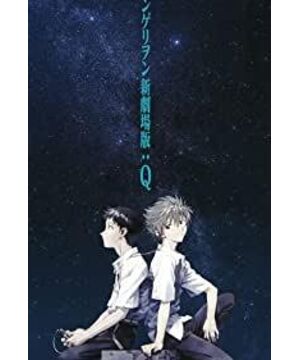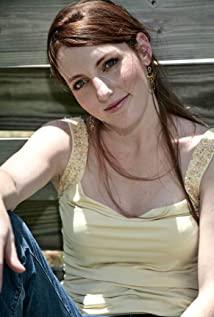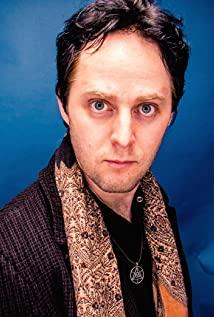In recent years, the only interesting animations/manga are only a few excellent works such as EVA and full-time hunters, because they are full of wisdom. But to be clear, this kind of wisdom is not smart, but a synthesis of many contents, the most important of which is the philosophy of EVA and the game of full-time hunters (Fujian Yibo can wrap himself in it).
I finished watching EVA's third theatrical version Q: YOU CAN (NOT) REDO yesterday. The first thing to say is that Q's picture quality is very good. Although there are a few characters that are very strange when they have side faces, the combination of CG and 2D in the whole film is perfect, especially the several mirrors inside wille The effect is outstanding, and compared to the original TV version of ten years ago, it is amazing.
The beginning of Q is very abrupt, but it has the effect of killing birds with one stone. On the one hand, it pays tribute to Mr. Hayao Miyazaki and Jebli Studio, and more importantly, it introduces the difference between the theatrical version and the original TV series in how people die: the TV version of people's death The method of death is the explosion of the human body, and the human body is completely transformed into lcl, which becomes a complete fusion, which solves the spiritual gap caused by the physical gap; and in Q, the mass demise of human beings is due to the opening of the door, causing another kind of creature ( Hypothetical angels) mass genocide massacres of humanity. And this beginning is very clever to explain why Katsuragi and others still survive, and at the same time lays the foundation for the change of the theme of the theatrical version, because the form always serves the content.
In addition to paying tribute to the predecessors, Anno Hideaki also paid tribute to the original TV series in this theater version, of course, to carry on the emotions of the old audience for ten years, and this part is the four-handed play of Ikari Shinji and Nagisa Kaoru, which is different from that of the year. Ikari Shinji and Asuka are in the same line through dance practice synchronization.
After paying tribute, I will focus on the changes in the new theatrical series in this part. As mentioned earlier, the way of human extinction introduced in the title has laid the foundation for the change of the theme of this film, and the addition of new characters and the relationship and names of the characters The change of source and the role of Ikari Yui in the plan show that these four theatrical versions are old bottles of new wine, and they carry more of Anno Hideaki's thinking about life updates (and also explain why it has been more than ten years, He still holds on to the EVA and does not let go. In fact, the EVA is not only the container of the soul, but also the container of Anno Hideaki's heart). The theme in the original version of the TV series is "Barrier-communication". Due to the physical independence between people, people cannot communicate completely and completely, and misunderstandings often lead to conflicts. In the original version of the TV series, seele directs nerv to complete The task lies here. In Q, what I felt more was the fear after Ikari Shinji returned fourteen years ago. And fear is the theme of Q. Fear is contained in all aspects of human life. In the play, Shinji Ikari has various unknown fears about whether he succeeded in rescuing Ling Bo after returning from a 14-year slumber, not knowing where he is, not knowing the whereabouts of his companions, and so on; Fear of changes in wille sky headquarters, not in nerv underground headquarters, changes in Katsuragi's attitude towards him, nerv headquarters open to destruction, the destruction of the earth, etc.; and the fear of knowing the truth that everything is caused by oneself . The fear and confusion in these Ikari Shinji's hearts run through the film.
And when the fault occurs, of course, the most hope is to take the regret medicine, and it seems that Shinji Ikari really got the regret medicine, so he can imagine the kind of hard work that he fought afterward, but there are a lot of dogs. Like the sci-fi movies of blood, the result of restoration is often a bigger evil. In Q, Chu Xun's profile is really annoying, but the feeling of "I live for the king" (so I die for the king) is abnormal. Moving, in fact, he also became the lamb that Shinji Ikari offered to God to atone for his sins (EVA really coincides with the Bible all the time).
In addition to this point, the film and the Bible (of course, the Bible referred to here is not the modern version, but the general name of the comprehensive version, because there is no such content as Adam's original wife Lilith in the modern King James version), wille's The name is also instantly recognizable. This involves another big change in this film. The senior leadership of seele (soul) composed of human beings has become a group of special organisms, and the purpose of this group of organisms is to exterminate human beings through nerv (nerve). , and when Ying Yuandu assured them that they would complete the purpose of destroying human beings, although they understood that Ying Yuandu had their own selfish intentions, but because of the same result, they voluntarily handed over power and withdrew. In this, Freud's id-ego-superego theory is implied: the id pursues pleasure (nerv), and Yuandu does everything he can to regain his own happiness; the superego pursues perfection (seele), seele does not Satisfied with the destruction of the earth by human beings and decided to eliminate human beings (which coincides with the story of Noah’s Ark in the Bible, God’s flood destroys human beings); while the self pursues reality (wille), what wille shows is the “free will” in Christ/Catholicism, It echoes the Titans part of the opening sequence, where the girl says, "We just want to survive".
Mere connotation makes Q a successful work.
After talking about the main content, talk about some small things. Especially in the theater version of this movie, Anno Hideaki directly used the German version of the chorus. The tragic singing and the plot of opening the "door" complement each other, making the impact of the climax of the whole film even more shocking.
But the new female characters have been added since the second part. I still don't understand what she is doing. Although she can always fight very well, is it Hideaki Anno's favorite girlfriend image? I hope there is an explanation of her more important significance in the fourth part.
In this play, the setting of Ling Bo has become an updated whiteboard, returning to the container that has no emotion and obeying orders. Many people feel sorry, but in fact, the most important meaning of Ling Bo is this, she is a "human nature." Evil" or "human nature is inherently good" game.
Asuka's age doesn't change, Anno Hideaki just passed "This is the curse of driving EVA" in a single stroke. Maybe the final meeting will give a little explanation, but don't expect too much, maybe you just can't find a good excuse. Another detail related to Asuka is the photo seen by Shinji Ikari, in which a woman in the lower right corner looks like him, probably in the final episode, the relationship between Asuka's mother and Shinji Ikari's family and why she is in Asuka's memories. The hospital will also have an account.
Another interesting point is that Katsuragi is a deputy in the mothership, so who is the main post? These little details are waiting for the final episode to be revealed.
In fact, the general title of the four parts of the new theatrical version is worth pondering. It is the so-called YOU CAN (NOT) ... series, which reflects Anno Hideaki's feelings about life: whether you can do something or not, it really doesn't matter. It's not entirely up to you to decide...
View more about Evangelion: 3.0 You Can (Not) Redo reviews








